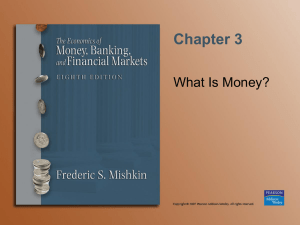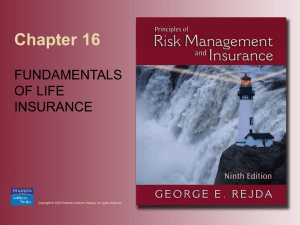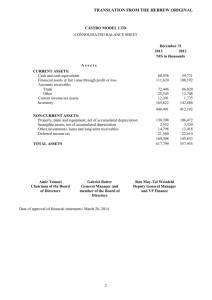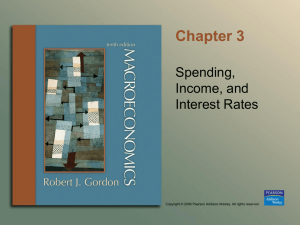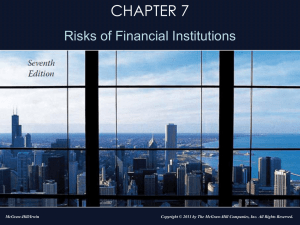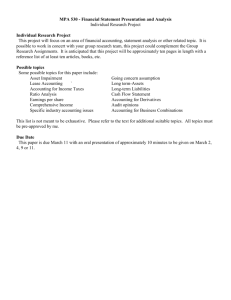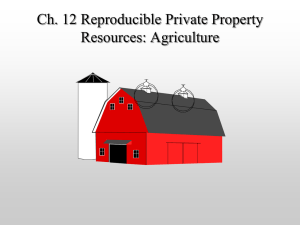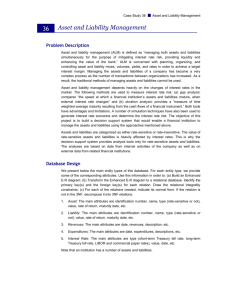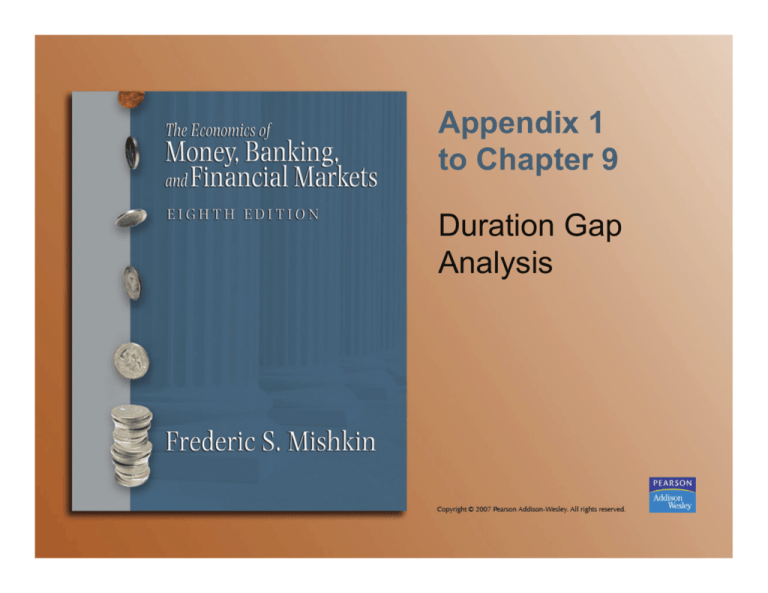
Appendix 1
to Chapter 9
Duration Gap
Analysis
Duration Gap Analysis
Examines the sensitivity of the market value of the financial institution's
net worth to changes in interest rates
i
%P DUR 1+ i
(P P )
= percent change in market value of the security
%P = t +1 t
Pt
DUR = duration (calculated for each asset and liability)
i = interest rate
After calculating the duration for each asset and liability,
the weighted duration is determined by multiplying the duration
times the amount of the asset divided by total assets
Adding all the weighted duration figures up yields the average duration
of either the assets or the liabilities
Copyright © 2007 Pearson Addison-Wesley. All rights reserved.
9A(1)-2
Example 1: Duration Gap Analysis
What happens when interest rates rise from 10% to 11%?
Total asset value = $100 M and total liabilities = $95 M
For assets
DUR = 2.70
i = 0.01
i = 0.10
0.01
= 0.025 = 2.5%
%P 2.70 1+ 0.10
For liabilities
DUR = 1.03
i = 0.01
i = 0.10
0.01
= 0.009 = 0.9%
%P 1.03
1+ 0.10
The net worth of the bank would decline by $1.6 M
Copyright © 2007 Pearson Addison-Wesley. All rights reserved.
9A(1)-4
Example 2: Duration Gap Analysis
A quicker way to arrive at the answer can be done by calculating the
Duration Gap
L
DURgap = DURa ( DURl )
A
DURa = average duration of assets
DURl = average duration of liabilities
L = market value of liabilities
A = market value of assets
For the previous example
DURgap = 2.70 (
Copyright © 2007 Pearson Addison-Wesley. All rights reserved.
95
1.03) = 1.72 years
100
9A(1)-5
Example 3: Duration Gap Analysis
Using the DURgap calculation to obtain the change in the market value
of net worth as a percentage of total assets
i
NW
DURgap 1+ i
A
Using the previous figures for an interest rate rise from 10% to 11%
0.01
NW
1.72 = 0.016 = 1.6%
1+ 0.10
A
With assets of $100M this is a fall in the market value of $1.6M
which is the same amount we found with the first example
Copyright © 2007 Pearson Addison-Wesley. All rights reserved.
9A(1)-6
Copyright © 2007 Pearson Addison-Wesley. All rights reserved.
9A(1)-7
Example of
a Nonbanking Financial Institution
Rate-sensitive assets equal $5M of securities with maturities less than one year
plus $50M of consumer loans with maturities of less than one year
Rate-sensitive liabilities equal $40M of commercial paper plus
$3M of bank loans both of which have maturities of less than one year
GAP = RSA RSL = $55M $43M = $12 M
The effect on income if interest rates rise by 1% is
I = GAP i = $12 M 1% = $120,000
Income will rise instead of fall as with the bank because there are
more rate-sensitive assets than rate-sensitive liabilities
Copyright © 2007 Pearson Addison-Wesley. All rights reserved.
9A(1)-8
Nonbanking Financial Institution
Duration Gap Analysis
Total assets = $100M; Duration for assets =1.16 years
Total liabilities = $90M; Duration for liabilities = 2.77 years
90
2.77) = 1.33 years
DURgap = 1.16 (
100
0.01
NW
= (1.33) = 0.012 = 1.2%
1+ 0.10
A
With assets of $100M, net worth will rise in market value by $1.2M
Copyright © 2007 Pearson Addison-Wesley. All rights reserved.
9A(1)-9
Problems with Income
and Duration Gap Analysis
• We assume that when the level of interest rates
changes, interest rates on all maturities change by
exactly the same amountthe slope of the yield cure
remains unchanged
• For the duration gap, if the interest rates for all
maturities are the same the yield curve is flat
• Duration gap analysis only works well for small
interest rate changes
• Must estimate the proportion that may be
rate-sensitive
• Cash payments are uncertain
• Good first assessment
Copyright © 2007 Pearson Addison-Wesley. All rights reserved.
9A(1)-10
Strategies for Managing
Interest-Rate Risk—1st National Bank
• Eliminate income gap
Increase rate-sensitive assets to $49.5M
Reduce rate-sensitive liabilities to $32M
• Immunize the market value of the bank’s net worth
by adjusting assets and liabilities so the duration gap
is zero
Reduce average duration of asset to 0.98 year
Increasing average duration of liabilities to 2.84 years
• These strategies can all be very costly in the short run
Copyright © 2007 Pearson Addison-Wesley. All rights reserved.
9A(1)-11

